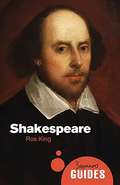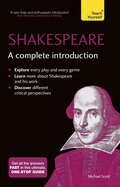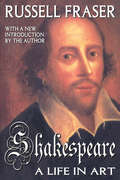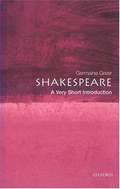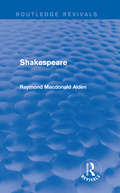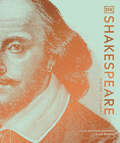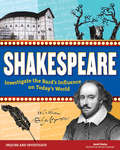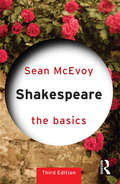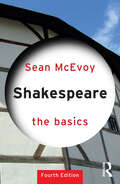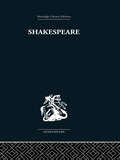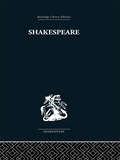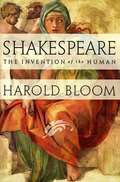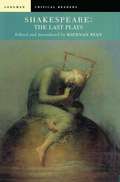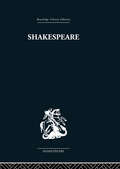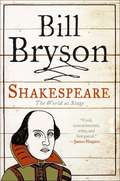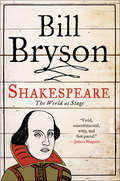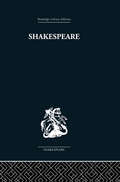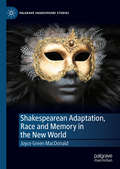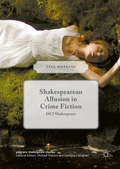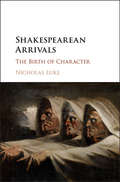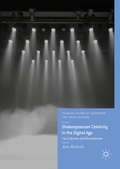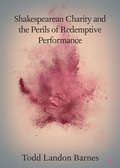- Table View
- List View
Shakespeare: A Beginner's Guide (Beginner's Guides)
by Ros KingWhether the fault of tedious teachers or hammy actors, Shakespeare is often seen as dry and impenetrable. In this fast-paced introduction, Ros King sets out to remind us of the sheer beauty and sophistication that can make Shakespeare's works a joy for any audience. Exploring his invention, wit, along with his uncanny characterisation, King argues archaic language should be no barrier to the modern reader. With summaries of The Bard's life and background, explanations of the plays' origins and instructions on how to read his poetry, Shakespeare: A Beginner's Guide provides all the tools the general reader needs to embrace the greatest writer in the English language.
Shakespeare: A Book of Quotations (Dover Thrift Editions Ser. #Vol. 7)
by William ShakespeareShakespeare is without doubt the most quoted writer in English. His plays and poems comprise an inexhaustible source of memorable and often profound thoughts beautifully and concisely expressed. This remarkably affordable volume presents over 400 quotations conveniently arranged by topic: love, marriage, conduct and morality, truth, beauty, time, death, music, and more.Included are such timeless observations as: "All that glitters is not gold," "Brevity is the soul of wit," "How sharper than a serpent's tooth it is/ To have a thankless child"; "While you live, tell truth and shame the devil!"; "The very substance of the ambitious is merely the shadow of a dream," and many more. Romantic thoughts receive a particularly rich treatment; extensive selections on the subject of love include quotes from the plays ("The course of true love never did run smooth"; "Speak low if you speak love") and sonnets ("For thy sweet love remember'd such wealth brings,/ That then I scorn to change my state with kings"). Each quote bears a complete citation.Ideal for writers, speakers, students of literature, and any lover of Shakespeare's works, this inexpensive treasury lends itself admirably to a virtually endless number of uses, from casual browsing to designing personal greeting cards.
Shakespeare: A Complete Introduction
by Michael ScottWritten by an academic and literary scholar with decades of experience in teaching Shakespeare to students at all levels, Shakespeare: A Complete Introduction is designed to give you everything you need to succeed, all in one place. It covers the key themes and critical concepts that students are expected to be confident in, outlining the ideas in clear jargon-free English, and then providing added-value features like key quotes, chapter recap sections, and even lists of questions you might be asked in your seminar or exam.The book organizes Shakespeare's work by genre and theme, in order to look closely at the individual plays. It opens with contextualizing information about the original texts, language usage, and how the plays were performed. The book is then grouped into the genres of early and romantic Comedies, Tragedies, Problem Plays, and the Histories. Each chapter will focus on one or two key plays, and foreground the themes and preoccupations that surround critical work on those plays. Throughout the book there will be an emphasis on the historical vs the contemporary approach, and the distinctions between literary and theatrical competencies.
Shakespeare: A Complete Introduction
by Michael ScottYour complete introduction to ShakespeareWilliam Shakespeare has been hailed as one of the greatest thinkers of all time, one of the world's finest artists, poets and dramatists. Shakespeare: A Complete Introduction introduces and explains the plays by looking at how they work, taking you on a journey through the genres of comedy, history and tragedy. The best known and most popular plays are discussed in detail and even plays in which Shakespeare may have had only the briefest creative and collaborative interest as a writer, get at least a mention. With material on his poetry and discussions on aspects of his life too, this truly is a complete introduction to Shakespeare.'A very lively and enthusiastic introduction to the full range of Shakespeare's plays' John Drakakis, Professor of English, University of Stirling'A masterpiece of the genre, written as it is with passion, without condescension, without jargon, thoughtful and open to changing critical theories, but always returning to the plays themselves, plays that fully reveal themselves most in performance.' Martin Wine, Professor Emeritus of English at the University of Illinois at Chicago (UIC)
Shakespeare: A Life in Art
by Russell FraserShakespeare: A Life in Art brings together in a single volume Fraser's previously published two-volume biography (Young Shakespeare, 1988, and Shakespeare: The Later Years, 1992). This volume includes a new introduction, which looks back on the author's lifelong commitment to Shakespeare's work and seeks to find the pattern in his carpet.Fraser's approach places Shakespeare's work first but shows how the life and art interpenetrate, like the yolk and white of one shell. What Shakespeare was doing in Stratford and London underlies what he was writing, or more exactly, the two flow together. Most of the book is devoted to Shakespeare the man and artist, but it simultaneously throws light on his literary and personal relations with contemporaries such as Jonson, Marlowe, and others known as the University Wits. His experience as an actor and man of theater is absorbingly recounted here, as well as his relations to well-born patrons like the Earl of Southampton and Henry Carey, Lord Hunsdon (England's Lord Chamberlain). In 1603 when James I ascended the throne, the Chamberlain's Men became the King's Men, passing under the sovereign's protection. How Shakespeare responded to his ambiguous role--he was both servant to the great and their remorseless critic--is another of Fraser's subjects. In short, Fraser's principal purpose is to advance our understanding of Shakespeare, at the same time throwing light on the work of the man who of all modern, and perhaps ancient poets had the largest and most comprehensive soul. John Dryden, Shakespeare's first great critic, said that, and Fraser tries to estimate what he meant.
Shakespeare: A Very Short Introduction
by Germaine GreerA clear introduction to Shakespeare's plays, this volume examines them in detail and shows how Shakespeare dramatized moral and intellectual issues in such a way that his audience became dazzlingly aware of an imaginative dimension to daily life. Germaine Greer argues that as long as Shakespeare's work remains central to English cultural life, it will retain the values which make it unique in the world.
Shakespeare: From The Quarto Of 1609, With Variorum Readings And Commentary (Routledge Revivals)
by Raymond Macdonald AldenThis fascinating title, first published in 1922, presents a detailed overview of the life and works of Shakespeare. Alden first considers Shakespeare’s Elizabethan context, alongside exploring the Classical and Italian foundations, political theories, concepts and theatrical trends that influenced his works. Next, a comprehensive biography provides insight into Shakespeare’s probable education, relationships and contemporaries. The final sections are devoted to the genres into which Shakespeare’s works have been categorised, with full analyses of and backgrounds to the poems, histories, comedies and tragedies. An important study, this title will be of particular value to students in need of a comprehensive overview of Shakespeare’s life and works, as well as the more general inquisitive reader.
Shakespeare: His Life and Works (DK Ultimate Guides)
by Leslie Dunton-Downer Alan RidingA comprehensive collection of the life and works of a literary great — William Shakespeare!The beautifully illustrated guide unravels the life and works of Shakespeare and his plays, from language, history, and themes to plays, poems, and sonnets. Explore the art of this famous playwright and his enduring legacy through the stunning gift format.Celebrate one of the theaters most influential contributors through his legendary works of comedy, tragedy, romance, and poetry. Inside this playbook, you&’ll find: • A clear and accessible format. • Plot summaries of all 39 plays with lists of characters. • Guidance on how to read and interpret his great sonnets and narrative poems. • Plays ordered by time and genre, helping readers trace the development of Shakespeare&’s topics, themes, and artistry. • Sidebars that clarify the mythological, geographical and historical context of each play and decode its language, dramatic action, and themes. • Illuminated guidance on how to approach reading the play and seeing it perform.Shakespeare fans will revel in the marvelous depiction of the Stratford-upon-Avon born Bard himself! His drama book allows you to dive into famous works like Hamlet, Romeo and Juliet, and A Midsummer Night&’s Dream, and explore Shakespeare&’s sources and inspirations for each! Themes, plots, characters, and language are brought to life with act-by-act plot summaries, resumes of main characters, and in-depth analysis of Shakespeare&’s use of the English language. Shakespeare: His Life and Works is a wonderful exploration of plays, poems, and sonnets in the context of his life and the Elizabethan and Jacobean theatre, further enriching your on the page (or stage, or screen!) experience.
Shakespeare: Investigate the Bard's Influence on Today's World
by Samuel Carbaugh Andi Diehn"Romeo, Romeo, wherefore art thou Romeo?" Teenagers have been sighing an approximation of these words for centuries, ever since William Shakespeare had Juliet utter them from her balcony in one of the most popular plays of all time, Romeo and Juliet. Tales of love, loss, rebellion, rivalry-before there was Twilight, Warm Bodies, and The Lion King, there was Shakespeare. The characters, language, imagery, and plot elements of many books and movies that appear on bookshelves and in cinemas today are directly influenced by the plays of the Bard.In Shakespeare: Investigate the Bard's Influence on Today's World, readers discover links between the books, movies, and music they listen to today and the words that were written and acted out more than 400 years ago. Readers deconstruct Shakespearean themes, imagery, language, and meaning by finding familiar ground on which to gain literary insight. Through hands-on projects such as coding a video game based on one of Shakespeare's plays to rewriting a scene in the text language of emoji, readers find compelling avenues into the dramatic, sometimes intimidating language, leaving them well-equipped to tackle any major text in the academic years to come.
Shakespeare: The Basics (The Basics)
by Sean McEvoyNow in its third edition Shakespeare: The Basics is an insightful and informative introduction to the work of William Shakespeare. Exploring all aspects of Shakespeare’s plays including the language, cultural contexts, and modern interpretations, this text looks at how a range of plays from across the genres have been understood. Updates in this edition include: Ecocritical, queer, presentist and gendered discussions of Shakespeare’s work Studies of new performances including Tennant and Tate’s Much Ado About Nothing Critical discussions of race and politics in Othello and King Lear Case studies of modern film versions of Shakespeare’s works A chronology of Shakespeare’s work and contemporary events With fully updated further reading throughout and a wide range of case studies and examples, this text is essential reading for all those studying Shakespeare’s work.
Shakespeare: The Basics (The Basics)
by Sean McEvoyShakespeare: The Basics is a lively and accessible introduction to reading and studying Shakespeare. Exploring all aspects of Shakespeare’s plays, Sean McEvoy considers the language, cultural contexts and modern interpretations.This essential guide to a range of contemporary Shakespearean criticism explores and unpacks the different dramatic genres in which he wrote – comedy, history, tragedy and romance. It also provides a wealth of relevant and concise information on the historical, social and political contexts in which the plays were produced and have been understood. Extensively updated throughout, the fourth edition provides: A comprehensive account of Shakespearean tragedy for students An introduction to ecocritical, ethical and queer readings of the plays Analysis of notable recent Shakespeare films and productions Enhanced contextual material on race and empire, gender roles and the theatre in politics With fully updated further reading throughout and a wide range of case studies and examples, Shakespeare: The Basics is an indispensable introduction for college and university students of literature and theatre, but also for anyone with an interest in the world’s most influential dramatist.
Shakespeare: The Cambridge Dover Wilson Shakespeare (cambridge Library Collection. Literary Studies) (Cambridge Dover Wilson Shakespeare Ser. #Vol. 17)
by George Ian DuthieFirst published in 1951. 'The book has the sterling qualities of shrewd sense and acumen that mark the 'rational' classical school of Shakespeare criticism.' Notes and Queries 'Professor Duthie's approach is direct and extremely objective. With no axe to grind, he pays impartial court to most of the great schools of Shakespearian criticism.' Cambridge Daily News 'Professor Duthie has much to say that is wise and judicious'. Times Literary Supplement. Contents include: Shakespeare's Characters and Truth to Life; Shakespeare and the Order-Disorder Antithesis; Comedy; Imaginative Interpretation and Troilus and Cressida; History; Tragedy; The Last Plays.
Shakespeare: The Dark Comedies to the Last Plays: from satire to celebration (Shakespeare Survey Ser. #44)
by R A FoakesFirst published in 1971. This volume explains and analyses the last plays of Shakespeare as dramatic structures. Beginning from the dark comedies, the author describes the ways in which Shakespeare was affected by the new techniques and possibilities for drama opened up by the innovations of the years after 1600, notably by the rise in children's companies. The main line of development of Shakespeare's dramatic skills is shown as leading from the dark comedies, through the late tragedies, to the last plays. A major part of the book is devoted to analyses of Cymbeline, The Winter's Tale, The Tempest and King Henry VIII.
Shakespeare: The Invention of the Human
by Harold Bloom"Shakespeare: The Invention of the Human is an analysis of the central work of the Western canon, and of the playwright who not only invented the English language, but also, as Bloom argues, created human nature as we know it today. Before Shakespeare there was characterization; after Shakespeare, there were characters, men and women capable of change, with highly individual personalities." "Shakespeare: The Invention of the Human is a companion to Shakespeare's work, and just as much an inquiry into what it means to be human. It explains why Shakespeare has remained our most popular and universal dramatist for more than four centuries, and in helping us to better understand ourselves through Shakespeare, it restores the role of the literary critic to one of central importance in our culture."--BOOK JACKET.Title Summary field provided by Blackwell North America, Inc. All Rights Reserved
Shakespeare: The Last Plays (Longman Critical Readers)
by Kiernan RyanThis is the first collection of criticism on Shakespeare's romances to register the impact of modern literary theory on interpretations of these plays. Kiernan Ryan brings together the most important recent essays on Pericles, Cymbeline, The Winter's Tale and The Tempest, the greatest of the `last plays', staging a dynamic debate between feminist, poststructuralist, psychoanalytic and new historicist views of the masterpieces Shakespeare wrote at the close of his career.The book aims not only to anthologise accounts of the last plays by leading Shakespearean critics, including Stephen Greenblatt, Janet Adelman, Leah Marcus, Howard Felperin and Steven Mullaney, but also to dramatise what is at stake in the choice of a particular critical approach. It allows the student to compare the strengths and limitations of a deconstructive and a feminist reading of the same romance, or to test the plausibility of one psychoanalytic angle on the last plays against another. The headnotes that preface the essays highlight their distinctive slants on Shakespearean romance, unpack the theoretical assumptions that steer their interpretations, and throw into relief the key points at which their authors collide or converge.The editor's introduction places the essays in the context of twentieth-century criticism of the last plays and makes a powerful case for a fundamental reappraisal of Shakespearean romance. The comprehensive, fully annotated bibliography provides an unrivalled guide to further reading on all four plays.
Shakespeare: The Poet in his World
by M. C. BradbrookFirst published in 1978. In this study, Shakespeare's own life story and the development of English theatrical history are placed in the wider context of Elizabethan and Jacobean times, but the works themselves are the final objective of this 'applied biography'. The main contention of the book is that Shakespeare's life was the lure of the stage itself which inspired him to transform what everyday life provided into the worlds of Hamlet, King Lear and Prospero.
Shakespeare: The World as Stage
by Bill BrysonAmerican native Bryson, alive and well in England, sets out what little is known about the life of the Elizabethan playwright and samples the voluminous scholarship about his work and its influence on English as a language and a body of literature. His approach is lighthearted and non-technical. Annotation ©2008 Book News, Inc., Portland, OR (booknews.com)
Shakespeare: The World as Stage
by Bill BrysonBill Bryson's bestselling biography of William Shakespeare takes the reader on an enthralling tour through Elizabethan England and the eccentricities of Shakespearean scholarship--updated with a new introduction by the author to commemorate the 400th anniversary of Shakespeare's deathWilliam Shakespeare, the most celebrated poet in the English language, left behind nearly a million words of text, but his biography has long been a thicket of wild supposition arranged around scant facts. With a steady hand and his trademark wit, Bill Bryson sorts through this colorful muddle to reveal the man himself. His Shakespeare is like no one else's--the beneficiary of Bryson's genial nature, his engaging skepticism, and a gift for storytelling unrivaled in our time.
Shakespeare: The art of the dramatist (Princeton Legacy Library #1782)
by Roland Mushat FryeThis edition first published in 1982. Previous edition published in 1972 by Houghton Mifflin. Outlining methods and techniques for reading Shakespeare's plays, Roland Frye explores and develops a comprehensive understanding of Shakespeare's drama, focussing on the topics which must be kept in mind: the formative influence of the particular genre chosen for telling a story, the way in which the story is narrated and dramatized, the styles used to convey action, character and mood, and the manner in which Shakespeare has constructed his living characterizations. As well as covering textual analysis, the book looks at Shakespeare's life and career, his theatres and the actors for whom he wrote and the process of printing and preserving Shakespeare's plays. Chapters cover: King Lear in the Renaissance; Providence; Kind; Fortune; Anarchy and Order; Reason and Will; Show and Substance; Redemption and Shakespeare's Poetics.
Shakespeare: Three Problem Plays (Analysing Texts Ser.)
by Nicholas MarshWritten in 1602-4, between Hamlet and the other great tragedies, Shakespeare's three Problem Plays are so called because they do not fit easily into the other groups of plays. They are awkward dramas, full of unresolved controversies, which leave audiences and readers unsettled by contradictory responses. Nicholas Marsh uses close analysis of extracts from the plays to explore how Shakespeare maintains competing discourses within a single text. In the first part of his study, Marsh highlights the multiple interpretations these plays provoke and provides useful sections on methods of analysis to encourage readers to develop their views independently. The second part of the book discusses the Problem Plays in relation to the playwright's other works, and examines their cultural and historical contexts. A comparison of five modern critical views and helpful suggestions for further reading provide a bridge to continuing study. In this essential guide to a complex set of plays, Marsh does not seek to reconcile the thorny issues these dramas leave open: rather, he equips the reader with the necessary critical tools to fashion their own synthesis.
Shakespearean Adaptation, Race and Memory in the New World (Palgrave Shakespeare Studies)
by Joyce Green MacDonaldAs readers head into the second fifty years of the modern critical study of blackness and black characters in Renaissance drama, it has become a critical commonplace to note black female characters’ almost complete absence from Shakespeare’s plays. Despite this physical absence, however, they still play central symbolic roles in articulating definitions of love, beauty, chastity, femininity, and civic and social standing, invoked as the opposite and foil of women who are “fair”. Beginning from this recognition of black women’s simultaneous physical absence and imaginative presence, this book argues that modern Shakespearean adaptation is a primary means for materializing black women’s often elusive presence in the plays, serving as a vital staging place for historical and political inquiry into racial formation in Shakespeare’s world, and our own. Ranging geographically across North America and the Caribbean, and including film and fiction as well as drama as it discusses remade versions of Othello, Romeo and Juliet, Antony and Cleopatra, and The Taming of the Shrew, Shakespearean Adaptation, Race, and Memory in the New World will attract scholars of early modern race studies, gender and performance, and women in Renaissance drama.
Shakespearean Allusion in Crime Fiction
by Lisa HopkinsThis book explores why crime fiction so often alludes to Shakespeare. It ranges widely over a variety of authors including classic golden age crime writers such as the four 'queens of crime' (Allingham, Christie, Marsh, Sayers), Nicholas Blake and Edmund Crispin, as well as more recent authors such as Reginald Hill, Kate Atkinson and Val McDermid. It also looks at the fondness for Shakespearean allusion in a number of television crime series, most notably Midsomer Murders, Inspector Morse and Lewis, and considers the special sub-genre of detective stories in which a lost Shakespeare play is found. It shows how Shakespeare facilitates discussions about what constitutes justice, what authorises the detective to track down the villain, who owns the countryside, national and social identities, and the question of how we measure cultural value.
Shakespearean Arrivals: The Birth of Character
by Nicholas LukeIn this distinctive study, Nicholas Luke explores the abiding power of Shakespeare's tragedies by suggesting an innovative new model of his character creation. Rather than treating characters as presupposed beings, Luke shows how they arrive as something more than functional dramatis personae - how they come to life as 'subjects' - through Shakespeare's orchestration of transformational dramatic events. Moving beyond dominant critical modes, Luke combines compelling close readings of Romeo and Juliet, Othello, Hamlet, Macbeth, and King Lear with an accessible analysis of thinkers such as Badiou, Zizek, Bergson, Whitehead and Latour, and the 'adventist' Christian tradition flowing from Saint Paul through Luther to Kierkegard. Representing a significant intervention into the way we encounter Shakespeare's tragic figures, the book argues for a subjectivity which is not singular or abiding, but perilous and leaping.
Shakespearean Celebrity in the Digital Age: Fan Cultures and Remediation (Palgrave Studies in Adaptation and Visual Culture)
by Anna BlackwellThis book offers a timely examination of the relationship between Shakespeare and contemporary digital media. By focusing upon a variety of ‘Shakespearean’ individuals, groups and communities and their ‘online’ presence, the book explores the role of popular internet culture in the ongoing adaptation of Shakespeare’s plays and his general cultural standing. The description of certain performers as ‘Shakespearean’ is a ubiquitous but often throwaway assessment. However, a study of ‘Shakespearean’ actors within a broader cultural context reveals much, not only about the mutable face of British culture (popular and ‘highbrow’) but also about national identity and commerce. These performers share an online space with the other major focus of the book: the fans and digital content creators whose engagement with the Shakespearean marks them out as more than just audiences and consumers; they become producers and critics. Ultimately, Digital Shakespeareans moves beyond the theatrical history focus of related works to consider the role of digital culture and technology in shaping Shakespeare’s contemporary adaptive legacy and the means by which we engage with it.
Shakespearean Charity and the Perils of Redemptive Performance (Elements in Shakespeare Performance)
by Todd Landon BarnesThis Element examines recent documentaries depicting marginalized youth who are ostensibly redeemed by their encounters with Shakespeare. These films emerge in response to four historical and discursive developments: the rise of reality television and its emphasis on the emotional transformation of the private individual; the concomitant rise of neoliberalism and emotional capitalism, which employ therapeutic discourses to individualize social inequality; the privatization of public education and the rise of so-called “no-excuses” or “new paternalist” charter schools; and the emergence of new modes of address infusing evangelical conversion narratives with a therapeutic self-help ethos.
